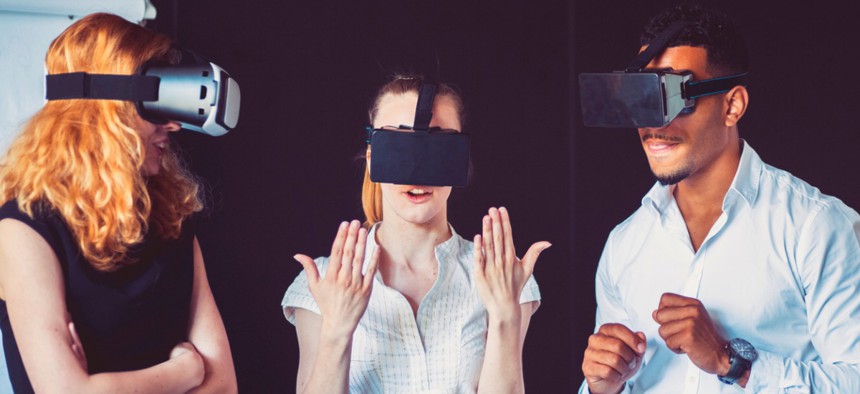Government Considers VR for Training and Therapy

gremlin/istockphoto.com
A slate of contracting calls demonstrate ways agencies are putting the emerging technology to use.
Federal agencies are increasingly adopting commercial virtual reality-centered tools to help personnel reach new gains in alignment with their overall missions.
Multiple posts on a primary government contracting site over the last month reflect some ways government entities are applying the immersive, emerging technology to meet their needs.
Virtual reality typically involves wearable devices that place users in three-dimensional, computer-generated environments and enable them to interact and engage with their surroundings. It’s part of the fast-growing field of extended reality technologies. Outside of the government, VR is used for entertainment purposes such as concerts, exhibits and video games. And it’s only getting more accessible—Canon this week released a new fisheye lens that’s intended to ease the production of such content.
Several federal agencies and the military have recently kicked off pursuits to strategically explore the potential of VR for medical purposes, training, situational awareness support and others are apparently in the pipeline.
In a request for information published this week, the Air Force inquired about potential partners that could develop add-on software models to provide an accurate, high-resolution and complete digital simulation of F-16 and C-17 cockpits for use in lightweight simulators that incorporate VR and are hosted in an immersive training environment.
“These digital models should represent the actual aircraft’s interior design and functionality,
mirroring its appearance and operation,” officials wrote.
Responses are due Nov. 4.
According to a separate solicitation with a deadline for submissions set for Oct. 20, the Naval Air Warfare Center Training Systems Division has a requirement to establish a virtual reality lab in Jacksonville, Florida and is looking into local area network hardware and infrastructure to underpin its formation. A statement of work attached to the publication suggests the Kingdom of Saudi Arabia is a partner in this work.
The Veterans Affairs Department articulated plans not long ago to up its use of extended reality capabilities. In a solicitation with responses due next week, the VA expresses aims to procure Food and Drug Administration-approved extended reality platforms that can be set to patients homes on rotational bases to enable next-level therapy experiences without having to enter a medical facility in the ongoing pandemic.
“[Extended reality] technology has the potential to improve remote therapy sessions by creating an immersive, customizable, and highly reliable assessment environment,” officials wrote in the release.
A few other government calls were open for the technology over the last month. Among them, Agriculture Department officials requested VR headsets for recruitment and training purposes, and Air Force officials called for a specific brand of such headsets to conduct one-on-one scenario based sexual assault prevention and response training.






